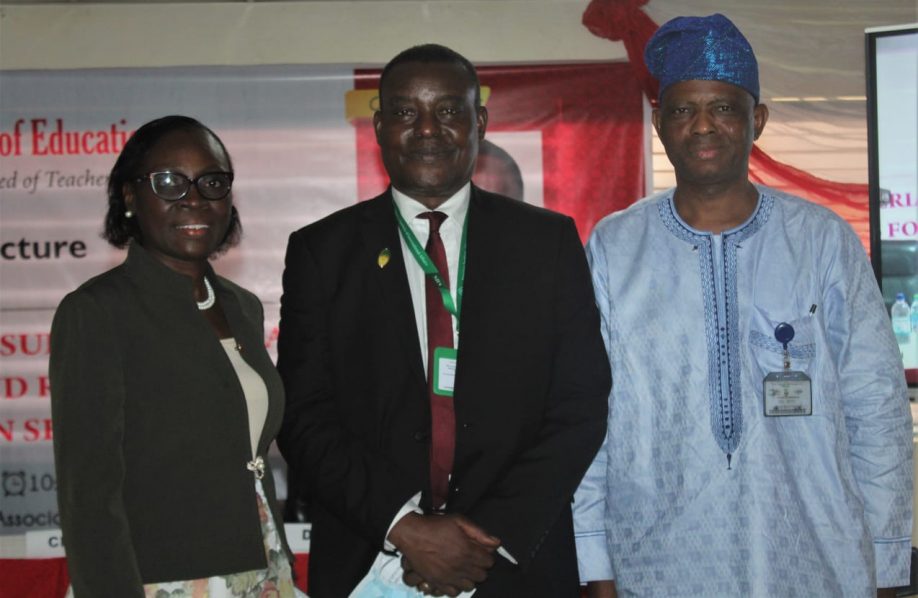
Provost, Corona College of Education, Dr. Olajumoke Mekiliuwa (left); Director General, Nigerian Institute of International Affairs (NIIA), Professor Eghosa Osaghae and Provost/Chief Executive Officer, Federal College of Education (Technical) Akoka, Dr. Ademola Wahab Azeez at the event held in Lagos.
The Corona College of Education, Lagos, has called on the Federal Government to declare a state of emergency on the education sector due to the emergent security issues in the country and its deabilitating effects on education.
The college also stated that there is the urgent need for value re-orientation and value transformation to adequately address the precarious state of the educational system in the country.
The call was made recently at the 3rd public lecture organised by Corona College of Education in Lagos.
Speaking on the theme ‘Emergent Security Issues in Nigeria: The Facts, Puzzles and Remedies for the Education Sector’, the Director-General of Nigerian Institute Of International Affairs; Africa’s foremost foreign policy think tank , Prof. Eghosa Osaghae, who was also the guest lecturer, urged government and every stakeholder who identifies with the problems of education in the country and not handle these emergent security Issues with levity.
He said: “People really need to know what it means when there is a crisis in a sector. It means that the country cannot make any meaningful economic development or growth if we don’t fix that sector.”
‘’The spate of the challenges, ranging from kidnappings, to banditry, militancy, terrorism, civil unrests, riots, environmental hazards, armed robbery and unprovoked shootings have a way of keeping our students out of school and when this happens, our youths will be an easy recruits for this bandits and terrorists.”
Osaghae lamented that though insecurity is a global problem, the state must see education as a veritable tool for defeating the monster and liberating the world. He said government must find a way of providing security for the sector and the nation must seriously invest in education, if we must catch up with the rest of the world on economic and infrastructural development.
He also canvassed for a technological driven curriculum to help job competencies of the youths and add value to the system.
The call to action by Corona College of Education comes amidst concerns for the poor state of education in Nigeria. According to UNICEF, one in every five of the world’s out-of-school children is in Nigeria. Even though primary education is officially free and compulsory, more than 10.5 million of the country’s children aged 5-14 years are not in school. Even when children go to school, the education they receive is often of low quality; based on outdated curricula without impacting the critical skills necessary to compete with children from other parts of the world. One of the areas where this is obvious is science, technology and innovation. The technology advocate, therefore, called for the mainstreaming of coding for Nigerians right from childhood.
Earlier in her welcome address the Provost of the college, Dr. Olajumoke Mekiliuwa, said the lecture topic was chosen to capture the numerous security threats confronting the nation’s educational institutions, from primary, secondary to tertiary schools, in recent times.
According to her the lecture was designed to generate discourses around pertinent issues in education to galvanise sustainable change in the education sector in Nigeria.
Mekiliuwa noted that education sector is a determining factor of change for the development of any country, not just Nigeria, but Africa as a whole.
“Government should embrace more actions and less talk in solving the problems of education which include, but not limited to, lack of innovation, lack of infrastructure and teaching aids, poor funding and governance,” she said.
The provost noted that these are apparently challenging times for parents, teachers, proprietors, administrators, staff and students nationwide, as the nation’s institutions have become the target of attacks from enemies within and without.
She said that the spate of attacks on schools in Nigeria in recent times is unprecedented and reports of teachers, lecturers and students abducted from schools, reports of teachers beaten by students/parents, reports of pupils attacking, bullying and inflicting harm on peers are all frightening dimensions to the issues of insecurity that warrants a gathering such as this.
It would be recalled that major findings showed that insecurity of the school environment significantly affects the academic performance of secondary school students, while smoking of Indian hemp, hard drugs, students’ cult activities, violence, kidnapping, armed robbery, parents confrontation of teachers, sexual harassment, rape and using of guns also have negative impacts on education.



